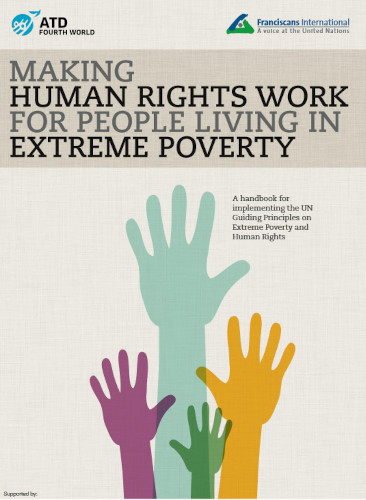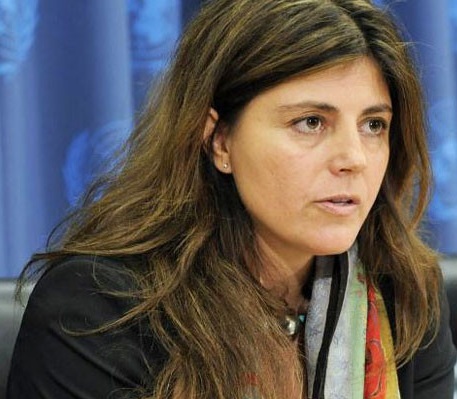Guiding Principles on Extreme Poverty and Human Rights

December 10 is Human Rights Day, observed every year around the world as the date when the United Nations adopted the Universal Declaration of Human Rights. When people living in poverty talk about their lives, it becomes very clear how poverty is, in fact, a violation of human rights.
One of ATD Fourth World’s primary advocacy efforts involves addressing extreme poverty from a human rights perspective; the UN Guiding Principles on Human Rights and Extreme Poverty set out clearly the implications of a human-rights-based approach, and so represent an important tool in that advocacy work.
 In this interview, Magdalena Sepúlveda Carmona, UN Special Rapporteur on extreme poverty and human rights from 2008 to 2014, talks about why the Guiding Principles are so important. Thanks to the efforts of ATD Fourth World, she explains, people living in poverty were even involved in writing them.
In this interview, Magdalena Sepúlveda Carmona, UN Special Rapporteur on extreme poverty and human rights from 2008 to 2014, talks about why the Guiding Principles are so important. Thanks to the efforts of ATD Fourth World, she explains, people living in poverty were even involved in writing them.
What are the Guiding Principles on Extreme Poverty and Human Rights?
“The Guiding Principles are a set of human rights standards adopted by the United Nations Human Rights Council in 2012. This is the first time that a document has included rules requiring states to respect people living in extreme poverty.
“The Guiding Principles address the significant social, cultural, economic, and structural barriers that people experiencing poverty face. These obstacles prevent them from accessing things to which they have a right. Such obstacles also increase their risk of being discriminated against and stigmatized, of becoming victims of violence, and of having poor health and insufficient education. All of these factors only increase and exacerbate the cycle of poverty with each generation.
“Based on international human rights standards, these principles will help legislators to develop policies that actually reach those in extreme poverty. The principles identify for policy makers the many obstacles people in poverty face in accessing their rights. All this will promote measures that respect rights and ensure their implementation.”
How did people in extreme poverty participate in writing the Guiding Principles?
“I think it’s fair to say that people experiencing poverty were the main trigger for the United Nations to develop these principles. We cannot forget that Joseph Wresinski [ATD Fourth World’s founder] himself urged the UN to develop mechanisms to protect the rights of people living in poverty. So thanks to the efforts of ATD Fourth World, people experiencing poverty were involved in consultations on the content of the Guiding Principles.
“I have to say that, for me, the formal and informal contributions of people in poverty have been essential in bringing this work to fruition. In fact, when I was preparing the draft of the Guiding Principles, I took into account the perspective of people experiencing poverty whom I know in countries I visited as Special Rapporteur. These people told me about their experiences and their ideas on many issues such as discrimination, social protection, and earning a living.”
Why do we need the Guiding Principles?
“Often policy makers neglect people living in poverty because of the major obstacles they face in accessing and benefiting from human rights. These obstacles can be connected to stigma, discrimination, financial obligations, social structures, etc. But we must insist on states’ obligations regarding the situation of people in poverty. Many human rights violations affect them more than any other group. Discrimination against those in extreme poverty is immense and generally tolerated.
“In fact, poverty is the main reason people are likely to experience discrimination and other human rights violations. In addition, people living in poverty are also commonly victims of discrimination based on where they are from, gender, disability, and other factors. This only worsens their situation. For this reason, states need guidance on how to implement their obligations to respect, protect, and fulfil the rights of people living in extreme poverty.”
Do you believe that the Guiding Principles will help the post-2015 Millennium Goals to ensure the full realization of human rights for all?
“Yes, I really hope so. This is our common challenge. We must work together to ensure a post-2015 agenda that truly takes into account the voices of those in poverty and the socially excluded. This is our main responsibility. There are many obstacles in our path. But I believe that if we really want to we can work together to see aspirations turn into reality. I am convinced that the adoption of the Guiding Principles constitutes a cornerstone for national and international efforts to protect the rights of those living in poverty. These principles could have a key role in protecting and empowering people living in poverty around the world.”
ATD and ten other international non-governmental organizations have developed a Handbook for implementing the UN Guiding Principles. “Making Human Rights Work for People Living in Extreme Poverty” translates the principles into language that everyone can understand. It puts forward concrete ideas for advancing the rights of people in extreme poverty.
Download and read “Making Human Rights Work for People Living in Extreme Poverty”
More in the Guiding Principles on Extreme Poverty and Human Rights

